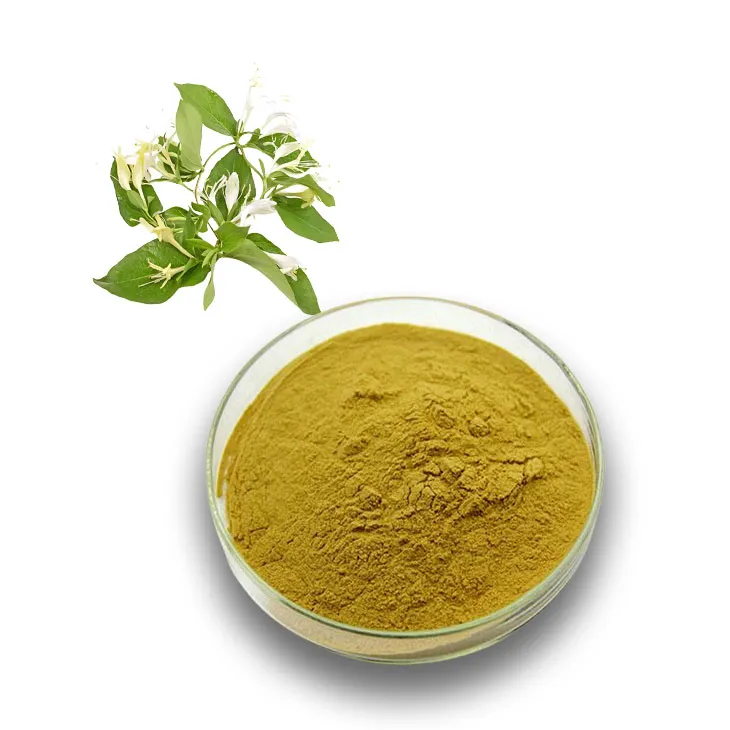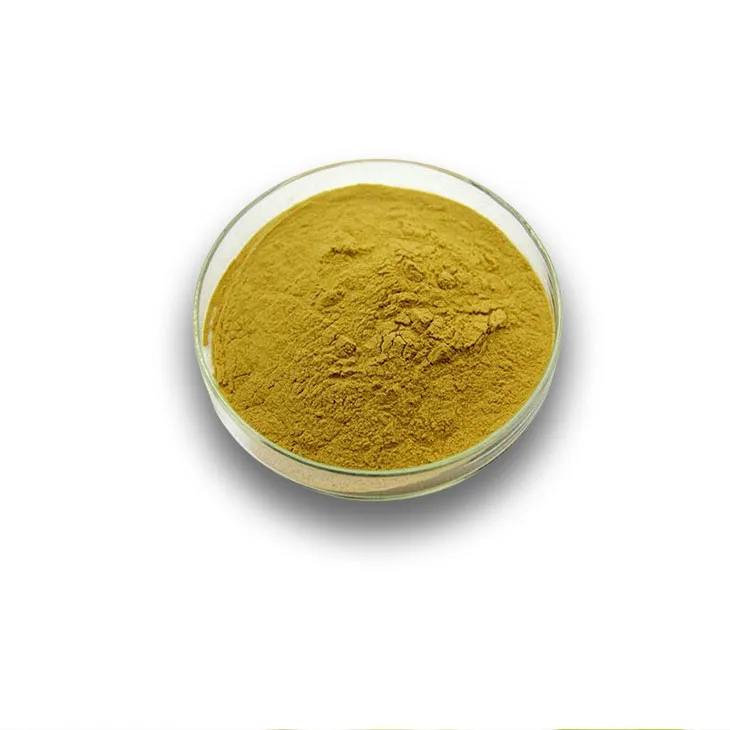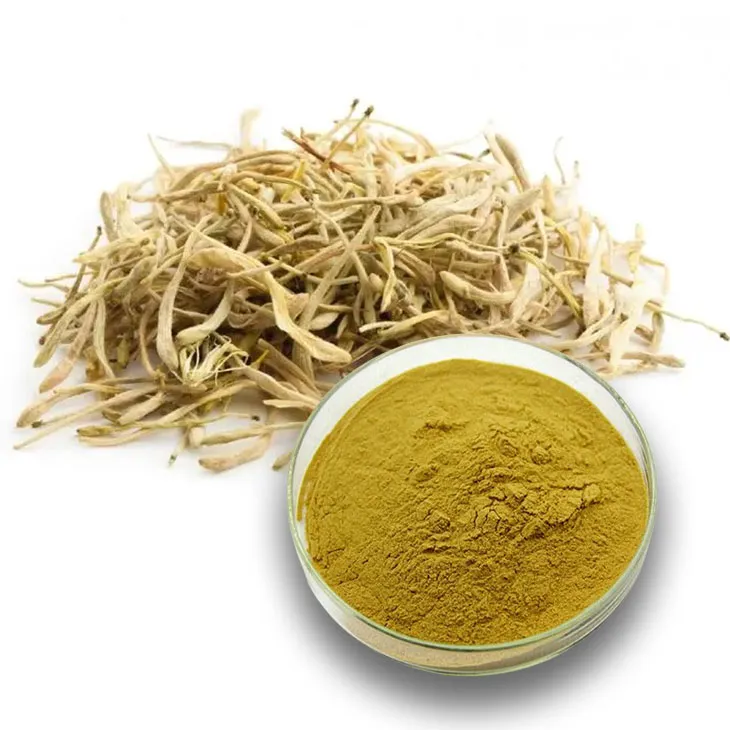- 0086-571-85302990
- sales@greenskybio.com
Is honeysuckle pollen beneficial for diabetes? Are these all safe and suitable for diabetic patients?
2024-11-13

1. Introduction
Diabetes has become a global health concern, affecting millions of people worldwide. Management of diabetes often involves a combination of lifestyle changes, medications, and sometimes the use of natural products. Honeysuckle Pollen has been used in traditional medicine in some cultures, and there is growing interest in its potential benefits for various health conditions, including diabetes. However, it is crucial to determine whether it truly has benefits for diabetes and whether it is safe for diabetic patients. This article will explore these aspects in detail.

2. What is Honeysuckle Pollen?
Honeysuckle Pollen is the male reproductive part of the honeysuckle plant. It contains a variety of bioactive compounds such as proteins, amino acids, vitamins, minerals, and flavonoids. These components may potentially play a role in influencing physiological functions in the body.

3. Potential Benefits for Diabetes
3.1 Influence on Blood Sugar Levels
Some studies suggest that certain compounds in honeysuckle pollen may have an impact on blood sugar levels. For example, flavonoids are known for their antioxidant properties and may also affect glucose metabolism. They could potentially enhance the uptake of glucose by cells, thereby reducing blood sugar levels. However, more research is needed to confirm these effects and to understand the exact mechanisms involved.
- One possible mechanism is the activation of insulin - sensitive pathways. Flavonoids may interact with proteins involved in insulin signaling, promoting better insulin sensitivity.
- Another aspect is the modulation of carbohydrate - digesting enzymes. Honeysuckle pollen might contain substances that can inhibit enzymes like alpha - glucosidase, which is responsible for breaking down complex carbohydrates into glucose. By inhibiting this enzyme, the absorption of glucose from the diet can be slowed down, leading to more stable blood sugar levels.
3.2 Anti - inflammatory Effects
Diabetes is often associated with chronic inflammation. Honeysuckle pollen's anti - inflammatory properties could potentially be beneficial for diabetic patients.
- The flavonoids and other bioactive compounds in honeysuckle pollen can suppress the production of inflammatory cytokines. These cytokines are molecules that are involved in the inflammatory response and can contribute to insulin resistance in diabetes.
- By reducing inflammation, it may also help in protecting the blood vessels from damage. Diabetic patients are at a higher risk of developing cardiovascular problems due to vascular damage caused by high blood sugar levels and inflammation. Honeysuckle pollen might play a role in preventing or reducing this damage.

4. Safety Concerns
4.1 Allergic Reactions
One of the primary safety concerns with honeysuckle pollen is the potential for allergic reactions.
- Allergic reactions can range from mild symptoms such as itching, sneezing, and runny nose to more severe reactions like difficulty breathing and anaphylactic shock. Diabetic patients who are already dealing with other health issues may be more vulnerable to the adverse effects of an allergic reaction.
- Individuals with a known allergy to pollen in general or honeysuckle specifically should avoid using honeysuckle pollen products.
4.2 Interaction with Medications
Diabetic patients often take medications to manage their blood sugar levels. There is a possibility of interaction between honeysuckle pollen and diabetes medications.
- For example, if honeysuckle pollen has a hypoglycemic effect (i.e., it lowers blood sugar), it could potentially interact with antidiabetic drugs such as sulfonylureas or metformin. This interaction might lead to dangerously low blood sugar levels (hypoglycemia), which can cause symptoms like dizziness, confusion, and even loss of consciousness.
- It is essential for diabetic patients to consult their healthcare providers before using honeysuckle pollen products, especially if they are on multiple medications.
4.3 Quality and Purity
The quality and purity of honeysuckle pollen products can also be a safety concern.
- Contamination with pesticides, heavy metals, or other harmful substances can pose risks to diabetic patients. Poorly sourced or processed pollen may contain these contaminants, which can have adverse effects on overall health.
- There is also a lack of standardization in the production and marketing of honeysuckle pollen products. This means that the content and potency of the active ingredients can vary widely between different products, making it difficult to determine the appropriate dosage and ensure safety.

5. Considerations for Diabetic Patients
Before diabetic patients consider using honeysuckle pollen, several factors need to be taken into account.
- Medical History: Diabetic patients should inform their healthcare providers about their entire medical history, including any existing allergies, other medical conditions, and medications they are taking. This information will help the healthcare provider assess the potential risks and benefits of using honeysuckle pollen.
- Monitoring: If a diabetic patient decides to use honeysuckle pollen under the supervision of a healthcare provider, regular monitoring of blood sugar levels is crucial. Any significant changes in blood sugar levels should be reported immediately, as it could indicate an interaction with medications or an unexpected effect of the pollen.
- Source and Product Selection: Diabetic patients should choose high - quality honeysuckle pollen products from reliable sources. Look for products that have been tested for purity and are free from contaminants. It is also advisable to choose products that are produced according to good manufacturing practices.
6. Conclusion
While there are some potential benefits of honeysuckle pollen for diabetes, such as its possible effects on blood sugar levels and anti - inflammatory properties, there are also significant safety concerns. Allergic reactions, potential interactions with medications, and issues related to quality and purity need to be carefully considered. Diabetic patients should not use honeysuckle pollen without consulting their healthcare providers. More research is needed to fully understand the role of honeysuckle pollen in diabetes management and to ensure its safety and efficacy for diabetic patients.
FAQ:
1. What are the potential benefits of honeysuckle pollen for diabetes?
Honeysuckle pollen may have several potential benefits for diabetes. It might help in regulating blood sugar levels. Some studies suggest that certain components in honeysuckle pollen could enhance insulin sensitivity, which is crucial for proper glucose metabolism in diabetic patients. Additionally, it may possess antioxidant properties that can reduce oxidative stress often associated with diabetes and its complications.
2. How does honeysuckle pollen affect blood sugar levels?
The exact mechanism by which honeysuckle pollen affects blood sugar levels is not fully understood. However, it is hypothesized that it may contain bioactive compounds that interact with the body's metabolic pathways related to glucose regulation. These compounds could either stimulate the release of insulin or improve the way cells respond to insulin, thus helping to lower blood sugar levels. But more research is needed to confirm these effects.
3. Is honeysuckle pollen safe for all diabetic patients?
No, honeysuckle pollen may not be safe for all diabetic patients. Some patients may be allergic to it, which can cause allergic reactions ranging from mild symptoms like itching and rashes to more severe ones such as difficulty breathing. Also, it could potentially interact with diabetes medications, so it is essential for diabetic patients to consult their healthcare providers before using honeysuckle pollen.
4. Can honeysuckle pollen replace diabetes medications?
No, honeysuckle pollen cannot replace diabetes medications. While it may have some beneficial effects on blood sugar levels and diabetes - related factors, it has not been proven to be as effective as established diabetes medications. Diabetes medications are specifically designed and clinically tested to control blood sugar levels, and any change in treatment should be made under the guidance of a healthcare professional.
5. Are there any side effects of honeysuckle pollen for diabetic patients?
Yes, there can be side effects. As mentioned, allergic reactions are a possibility. In addition, if taken in large amounts, it may cause digestive problems such as nausea, vomiting, or diarrhea. And as it may interact with medications, it could lead to unexpected changes in blood sugar levels or other adverse effects.
Related literature
- Title: The Potential Role of Honeysuckle Pollen in Diabetes Management"
- Title: "Honeysuckle Pollen and Its Impact on Insulin Sensitivity in Diabetic Patients"
- Title: "Safety Considerations of Honeysuckle Pollen Use in Diabetes"
- ▶ Hesperidin
- ▶ citrus bioflavonoids
- ▶ plant extract
- ▶ lycopene
- ▶ Diosmin
- ▶ Grape seed extract
- ▶ Sea buckthorn Juice Powder
- ▶ Beetroot powder
- ▶ Hops Extract
- ▶ Artichoke Extract
- ▶ Reishi mushroom extract
- ▶ Astaxanthin
- ▶ Green Tea Extract
- ▶ Curcumin Extract
- ▶ Horse Chestnut Extract
- ▶ Other Problems
- ▶ Boswellia Serrata Extract
- ▶ Resveratrol Extract
- ▶ Marigold Extract
- ▶ Grape Leaf Extract
- ▶ blog3
- ▶ blog4
- ▶ blog5
-
Organic Tongkat Ali extract powder factory.
2024-11-13
-
How to make powder with ashwagandha extract.
2024-11-13
-
Rosehip extract manufacturers from China.
2024-11-13
-
The best cat's claw extract in nature.
2024-11-13
-
Chinese Dandelion Leaf Extract Suppliers.
2024-11-13
-
Ivy Extract
2024-11-13
-
Phyllanthus Emblica Extract
2024-11-13
-
Uridine-5'-monophosphate Disodium salt
2024-11-13
-
Hericium erinaceus extract powder
2024-11-13
-
Beta Carotene
2024-11-13
-
Scutellaria Extract
2024-11-13
-
Green Tea Extract
2024-11-13
-
Sugarcane Extract
2024-11-13
-
Peppermint Extract Powder
2024-11-13
-
Acerola Juice Powder
2024-11-13





















